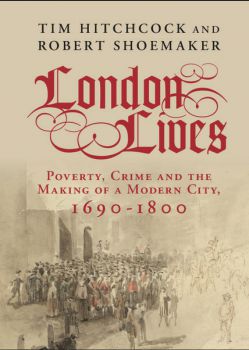Georgian jailbirds and celebrity highwaymen shaped modern Britain, say historians
Eighteenth-century thieves, paupers, prostitutes and highwaymen helped to shape the evolution of modern justice and welfare systems, according to newly published evidence uncovered by two historians from the universities of Sussex and Sheffield.

Based on evidence in a publically available database, the London Lives project sheds new light on the everyday lives of 18th-century poor and criminal Londoners.
The data shows that paupers used their limited written and oral skills to cajole and embarrass parish elites, leading to the creation of a more comprehensive welfare system.
Meanwhile the courtroom strategies of street robbers laid the foundations for the rise of the adversarial trial – a legal system used by common law countries such as the UK and US which allows legal representation to both parties.
Criminals who illustrated the failure of justice through constant escapes and charismatic leadership forced the state to build a new world of prisons but also gave hope to some in the wider working classes, according to the historians.
Tim Hitchcock is Professor of Digital History at Sussex and Co-Director of the Sussex Humanities Lab. He said: “We began by digitising the records of the Old Bailey, London’s central criminal court, and the records of poor relief and other criminal courts held at London’s Metropolitan Archives.
“We then created a website which allowed us to chart the experiences of everyday Londoners who found themselves submerged in poverty or prosecuted for crime.
“What we uncovered was extraordinary: thieves, paupers, prostitutes and celebrity highwaymen, who, again and again, through their cunning, courage, and resourcefulness, forced the pace of change in the evolution of the criminal justice system and the system of poor relief.”
Co-author Professor Bob Shoemaker from the University of Sheffield said: “The London Lives project has uncovered a fascinating new insight into lives and experiences of hundreds of thousands of Londoners in the 18th century.
“They found themselves submerged in poverty or prosecuted for crime but the way they responded forced the authorities to fundamentally transform social policy and the criminal justice system.
“The study shows that celebrity highwaymen, prison escapees, expert manipulators of the poor relief system, lone mothers and vagrants played the system to the best of their ability in order to survive. In their acts of desperation, the poor and criminal exercised a profound and effective form of agency that changed the system itself.”
The study’s findings are revealed in: London Lives: Poverty, crime and the making of a modern city, 1690-1800, published in December 2015.
With Professor Shoemaker and others, Professor Hitchcock is responsible for a series of websites giving direct and searchable access to some 20 billion words of primary sources reflecting the social history of Britain, including:
In 2011 Professors Hitchcock and Shoemaker were awarded the Longman-History Today Trustees Award, for their “major contribution to history” through their work on the Old Bailey and London Lives projects.
They are currently co-investigators on the Digital Panopticon project, which is tracing the criminal and penal careers of 90,000 people sentenced at the Old Bailey between 1780 and 1865.
